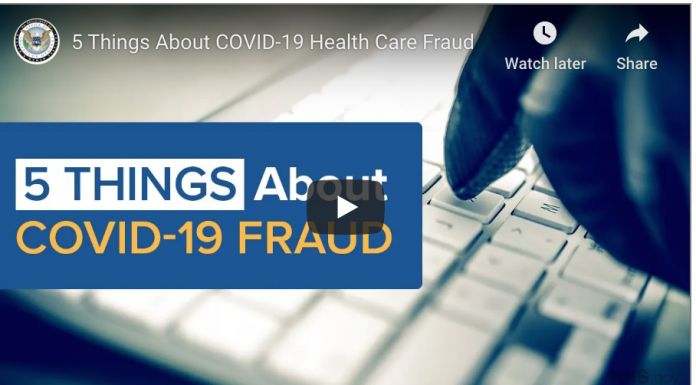The U.S. Department of Health and Human Services Office of Inspector General is alerting the public about fraud schemes related to the novel coronavirus (COVID-19).
Scammers are using telemarketing calls, text messages, social media platforms, and door-to-door visits to perpetrate COVID-19-related scams.
Fraudsters are offering COVID-19 tests, HHS grants, and Medicare prescription cards in exchange for personal details, including Medicare information. However, these services are unapproved and illegitimate.
These scammers use the coronavirus pandemic to benefit themselves, and beneficiaries face potential harm. The personal information collected can be used to fraudulently bill federal health care programs and commit medical identity theft.
Protect Yourself
– Be vigilant and protect yourself from potential fraud concerning COVID-19 vaccines. You will not be asked for money to enhance your ranking for vaccine eligibility.
– Government and State officials will not call you to obtain personal information in order to receive the vaccine, and you will not be solicited door to door to receive the vaccine.
– Beneficiaries should be cautious of unsolicited requests for their personal, medical, and financial information. Medicare will not call beneficiaries to offer COVID-19 related products, services, or benefit review.
– Be suspicious of any unexpected calls or visitors offering COVID-19 tests or supplies. If you receive a suspicious call, hang up immediately.
– Do not respond to, or open hyperlinks in, text messages about COVID-19 from unknown individuals. [Protecting readers from fraud and hoaxes is a key reason links are not permitted in the Headline Health comments area. – Editor]
– Ignore offers or advertisements for COVID-19 testing or treatments on social media sites. If you make an appointment for a COVID-19 test online, make sure the location is an official testing site.
– Do not give your personal or financial information to anyone claiming to offer HHS grants related to COVID-19.
– Be aware of scammers pretending to be COVID-19 contact tracers. Legitimate contact tracers will never ask for your Medicare number, financial information, or attempt to set up a COVID-19 test for you and collect payment information for the test.
If you suspect COVID-19 health care fraud, report it immediately online or call 800-HHS-TIPS (800-447-8477). SOURCE | Last updated: December 21, 2020
Consumer Fraud Alert: COVID-19
Scammers use public health emergencies as opportunities for new fraud schemes, and because older adults are at greater risk for serious illness from COVID-19, they may target older populations.
It’s important to remember that although the Centers for Disease Control and Prevention (CDC) and other public health officials may contact you if they believe you may have been exposed to the virus, they will not need to ask you for insurance or financial information.
Scammers rapidly alter their tactics and adapt their schemes to the changing landscape, and we anticipate that they will leverage the COVID-19 vaccine to prey on unsuspecting beneficiaries.
Be vigilant and protect yourself from potential fraud concerning COVID-19 vaccines and treatments.
Here are things you need to know about the COVID-19 vaccine:
- You likely will not need to pay anything out-of-pocket to get the vaccine during this public health emergency.
- You cannot pay to put your name on a list to get the vaccine.
- You cannot pay to get early access to the vaccine.
- You will not be solicited door to door to receive the vaccine.
- No one from Medicare or the Health Department with contact you.
- No one from a vaccine distribution site or health care payer, like a private insurance company, will call you asking for your Medicare number, Social Security number, or your credit card or bank account information to sign you up to get the vaccine.
The Senior Medicare Patrol (SMP) recommends that Medicare beneficiaries:
- Contact your own doctor if you are experiencing potential symptoms of COVID-19.
- Do not give out your Medicare number, Social Security number, or personal information in response to unsolicited calls, texts, emails, home visits, or booths at health fairs and other public venues. If your personal information is compromised, it may be used in other fraud schemes as well.
- Be suspicious of anyone going door-to-door to offer free coronavirus or COVID-19 testing, supplies, treatments, or vaccines.
- Beware of providers offering other products, treatments, or medicines to prevent the virus. Check with your health care provider before paying for or receiving any COVID-19-related treatment.
- If you get a call, text, email — or even someone knocking on your door — claiming they can get you early access to the vaccine, STOP. That’s a scam.
- Carefully review your Medicare Summary Notice (MSN) or Explanation of Benefits (EOB), looking for errors or claims for products or services that weren’t received.
- Follow the instructions of your state or local government for other actions you should be taking in response to COVID-19.
- Contact your local SMP for help. SMPs empower and assist Medicare beneficiaries, their families, and caregivers to prevent, detect, and report health care fraud, errors, and abuse.
The Senior Medicare Patrol (SMP) is ready to provide you with the information you need to PROTECT yourself from Medicare fraud, errors, and abuse; DETECT potential fraud, errors, and abuse; and REPORT your concerns. SMPs help educate and empower Medicare beneficiaries in the fight against health care fraud. Your SMP can help you with your questions, concerns, or complaints about potential fraud and abuse issues. It also provides information and educational presentations. To locate your local Senior Medicare Patrol, call 1-877-808-2468 or visit www.smpresource.org.



